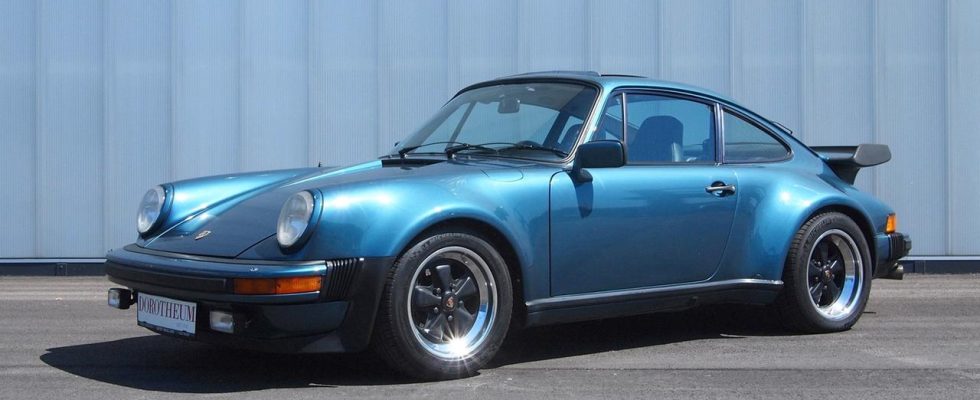In 1948, Ferry Porsche developed the first Porsche sports car. Since then, the brand has become indispensable in motorsport and the luxury segment. Now the company has to master the transition to electromobility.
Michael Braun’s “piece of gold” needs a moment, then the 75 hp engine starts bubbling and white smoke escapes from two small pipes at the rear of the car. At idle, the former plumbing company owner accelerates a little and then pushes the dainty gear selector forward. The car rolls past the Porsche headquarters through Stuttgart-Zuffenhausen.
At the end of the town, Braun accelerates and can hardly be understood. “That’s passion. That’s the driving pleasure with Porsche. The engine is what we like to hear while driving,” he enthuses and beams. There is no radio in his “Goldstück”, which is actually dark green.
Beginnings in Austria, breakthrough in Stuttgart
By 1966, Porsche had built a total of 77,766 vehicles with the code 356, the first 52 still in Gmünd, Austria. “Ferry Porsche was looking for a light, efficient vehicle that would convert energy into driving dynamics in the best possible way,” says Achim Stejskal, head of the Porsche Museum in Stuttgart. The last work is being done in the museum before the start of the special exhibition for the 75th anniversary.
“And that was the 356, a lightweight aluminum vehicle weighing 585 kilograms with a modified Beetle engine that already existed at the time with 35 hp.” The first prototype was registered on June 8, 1948 – the birth of Porsche sports cars. Soon after, the first Porsche 911 sees the light of day. No model represents Porsche as much as the 911.
By 1966, Porsche had built a total of 77,766 vehicles with the code 356. The first prototype was registered on June 8, 1948.
The 911 as a symbol of the entire brand
New technical developments that had previously been tested in motorsport were introduced. “The vehicle drove faster, it drove more elegantly. It had more space, more horsepower,” says museum director Stejskal. “You could drive the vehicle, as Ferry Porsche once said very impressively, in the African desert, but also on the streets of New York.”
According to Stejskal, the 911 symbolizes everything that defines Porsche: “Power, dynamics, but also design and sportiness paired with suitability for everyday use.” The Porsche 911 has long since become a symbol of the Stuttgart car manufacturer. And so it is not surprising that Porsche chose the abbreviation “P911” for its IPO last year. It’s a number combination that works internationally.
More valuable than parent company Volkswagen
“Porsche is pursuing a value-oriented corporate strategy,” says Helena Wisbert from the Ostfalia University of Applied Sciences in Braunschweig. “So you always produce one less vehicle than the market would like. That works very well in the luxury and sports car segment,” explains the professor of automotive economics.
Since the IPO last September, Porsche securities have increased in value by more than 40 percent. The company is now more valuable on paper than car giant Volkswagen.
With a view to the end of combustion engines in the EU in 2035, Wisbert still sees a lot to do: “Porsche is in a very good position now, but it’s still the old classic world of combustion engines. And in the future, Porsche will have this major transformation in the direction of Electromobility still ahead.”
The Stuttgart-based company currently only offers one fully electric Porsche, the Taycan. Depending on the model, customers should be able to travel up to 500 kilometers with one battery charge
80 percent electric vehicles by 2030
The Stuttgart-based company currently only offers one fully electric Porsche, the Porsche Taycan. In the sportiest variant, the sports car drives with the equivalent of 761 hp. Depending on the model, customers should be able to travel up to 500 kilometers with one battery charge. In real operation it will probably be significantly less. Automobile expert Wisbert is certain that Porsche still has a long way to go because: “As a fully electric car, the Taycan now accounts for just eleven percent of Porsche sales.”
By 2030, however, the Stuttgart-based company wants to deliver 80 percent of new cars with electric drives. Classic car fan Michael Braun in Stuttgart thinks this step is the right one: “Electrical engineering will be the future. Electrical engineering delivers so much power. You no longer need a combustion engine.” He himself, he admits, would probably be missing something with the silent locomotion. The bubbling of his historic Porsche 356 4-cylinder is something very special.

